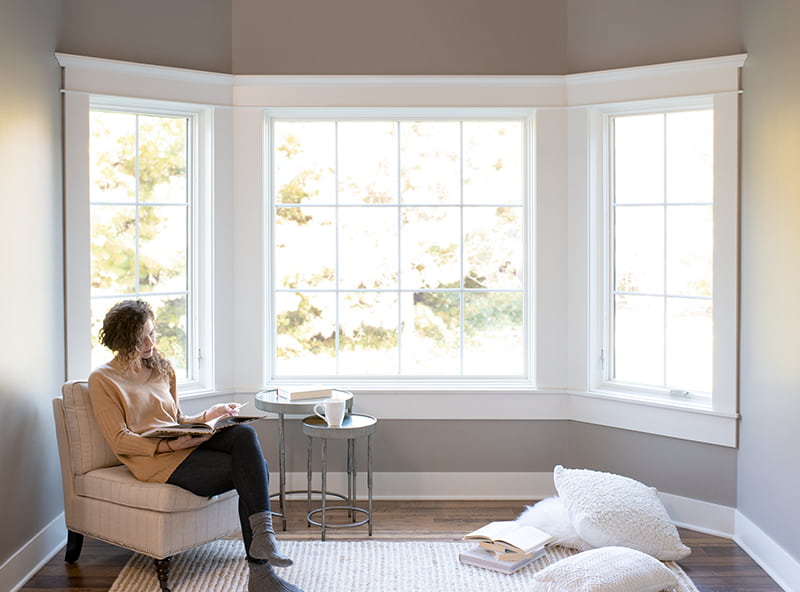5 Ways Windows Affect Your Health and Wellbeing
From stress levels and sleep quality to indoor air quality, learn how windows can help improve your overall wellness.

Published 2022-12-02

When you bring up the topic of health and wellbeing, most think of physical health, a balanced diet or regular exercise. While all these contribute to overall wellbeing, there are many factors to consider as well. It might surprise you to learn that even the windows in your home can impact your health and wellbeing. Read on for five ways that windows can help improve your life.
1. Windows can help improve the indoor air quality in your home.
According to the Centers for Disease Control and Prevention, “improving ventilation can help you reduce virus particles in your home and keep COVID-19 from spreading.” In other words, good ventilation, like opening your windows for fresh air, can help prevent you and others from getting and spreading respiratory viruses. Adding screens to your windows allows you to maximize fresh outdoor air while keeping insects out. Between-the-glass blinds and shades also help reduce allergens and dust in the air. The window treatments are tucked between panes of glass, protected from both dust and damage. From screens to blinds and shades, windows can play a key role in improving the air quality inside your home.
2. Windows can help you control noise
It’s well known that noise pollution can lead to hearing loss, but did you know that sound exposures can also contribute to health complications like cardiovascular diseases, obesity, developmental delays, mental illness, and reduced job and academic performance? That’s according to a study by the American Academy of Nursing. Reducing noise, they found, will decrease the incidence of diseases and also decrease health care costs. Put simply, controlling noise levels is good for human health.
In a separate study by the National Center for Biotechnology Information, it was found that the quieter the environment, the better the sleep and human health. This study notes that “under conditions of equal sleep efficiency, a significant increase in deep sleep … was determined in an acoustically isolated room in comparison to the two other sleep locations.”
Whether it’s a loud city, barking dog or neighbor’s lawn mower, your windows can help block out noise exposures that can be harmful to health. It takes several parts of a window, working together, to control noise and enhance sound performance in your home.
Triple-pane glass adds more layers of insulation to help dampen outside noises. Varying glass thicknesses paired in one window also help lessen different sounds at different frequencies. Insulating frames reduce noise transfer as well. While soundproof windows don’t exist, there are a number of factors within a window’s design that can help control sound in your house and protect you from noise pollution at home.
3. Windows can help you sleep better and wake up in the morning.
Sleeping is a basic human need. Like eating, drinking and breathing, we all need sleep in order to maintain good health and well being throughout life. “Sleep deficiency,” according to the National Heart, Lung and Blood Institute, “can lead to physical and mental health problems, injuries, loss of productivity, and even a greater likelihood of death.”
The number, size and location of windows in your home are the primary factors affecting natural light intake. Windows control the amount of daylight allowed to enter your space, while blinds and shades can help you block light out when it’s time to sleep.
The International Journal of Environmental Research and Public Health found that “as the primary environmental cue for the body’s master biological clock, light–dark patterns are key for circadian alignment and are ultimately fundamental to multiple dimensions of health including sleep.” Your body releases chemicals in a daily rhythm that your body clock controls. When it gets dark, your body releases melatonin which signals that it's time to prepare for sleep. As the sun rises, your body releases a hormone called cortisol which naturally prepares your body to wake up. Thus, natural light is a critical cue for your body to know when to feel awake and when to feel sleepy.
4. Windows can help improve energy efficiency in your home
To create a better world, we must create better homes. Windows are a great place to start to make your home more energy efficient. Installing efficient windows can reduce the amount of heat that escapes or enters your home. Increased insulation, Low-E glass and proper installation of windows help reduce your home’s energy usage and carbon footprint — and in turn, your utility bills. Plus, efficient windows help to deliver year-round comfort for you and your family.

5. Windows can help improve your mood and reduce stress levels.
Being exposed to natural light promotes the production of serotonin which has been proven to positively impact your mood. Sunlight and looking out the window at nature can help reduce stress levels and anxiety. Windows and doors are vital to creating an indoor and outdoor connection. They make your home feel like a sanctuary by incorporating the peace and beauty of nature into your house.
Windows can positively affect your health and wellbeing in many ways. Whether you want to sleep better, breathe higher quality air or reduce your carbon footprint, windows help make a difference in your everyday wellness. To learn more about replacing your windows, connect with a Pella expert in your area.
Schedule a free consultation to find windows and doors for your home.